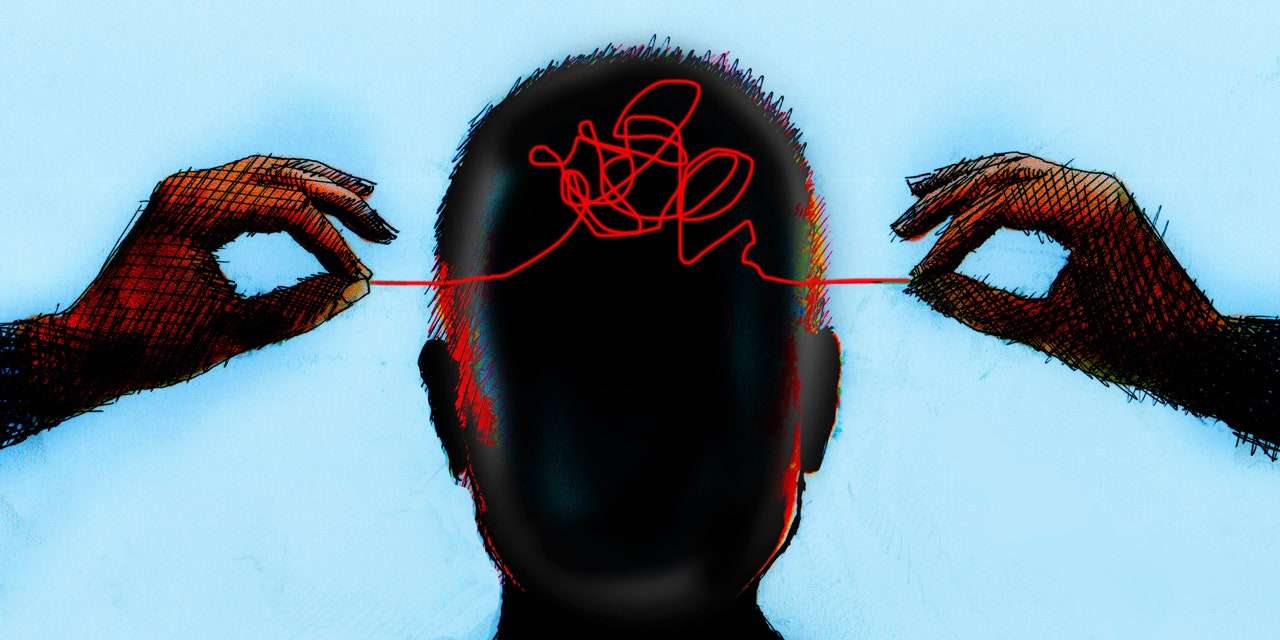Cognitive behavioural therapy (CBT) is a talking therapy that can help you manage your problems by changing the way you think and behave.
It’s most commonly used to treat anxiety and depression, but can be useful for other mental and physical health problems.
How CBT works
CBT is based on the concept that your thoughts, feelings, physical sensations and actions are interconnected, and that negative thoughts and feelings can trap you in a negative cycle.
CBT aims to help you deal with overwhelming problems in a more positive way by breaking them down into smaller parts.
You’re shown how to change these negative patterns to improve the way you feel.
Unlike some other talking treatments, CBT deals with your current problems, rather than focusing on issues from your past.
It looks for practical ways to improve your state of mind on a daily basis.
What happens during CBT sessions
If CBT is recommended, you’ll usually have a session with a therapist once a week or once every 2 weeks.
The course of treatment usually lasts for between 6 and 20 sessions, with each session lasting 30 to 60 minutes.
During the sessions, you’ll work with your therapist to break down your problems into their separate parts, such as your thoughts, physical feelings and actions.
You and your therapist will analyse these areas to work out if they’re unrealistic or unhelpful, and to determine the effect they have on each other and on you.
Your therapist will then be able to help you work out how to change unhelpful thoughts and behaviours.
After working out what you can change, your therapist will ask you to practise these changes in your daily life and you’ll discuss how you got on during the next session.
The eventual aim of therapy is to teach you to apply the skills you have learnt during treatment to your daily life.
This should help you manage your problems and stop them having a negative impact on your life, even after your course of treatment finishes.
Pros and cons of CBT
Cognitive behavioural therapy (CBT) is effective in treating some mental health problems, but it may not be successful or suitable for everyone.
Some of the advantages of CBT include:
- it can be completed in a relatively short period of time compared with other talking therapies
- the highly structured nature of CBT means it can be provided in different formats, including in groups, self-help books and online
- it teaches you useful and practical strategies that can be used in everyday life, even after the treatment has finished
- it focuses on the person’s capacity to change themselves (their thoughts, feelings and behaviours)
- it can be as effective as medicine in treating some mental health problems and may be helpful in cases where medicine alone has not worked
Some of the disadvantages of CBT to consider include:
- you need to commit yourself to the process to get the most from it – a therapist can help and advise you, but they need your co-operation
- attending regular CBT sessions and carrying out any extra work between sessions can take up a lot of your time
- it may not be suitable for people with more complex mental health needs or learning difficulties
- it involves confronting your emotions and anxieties – you may experience initial periods where you’re anxious or emotionally uncomfortable
- it does not address any wider problems in systems or families that may have a significant impact on someone’s health and wellbeing
Some critics also argue that while CBT addresses current problems and focuses on specific issues, it does not address the possible underlying causes of mental health conditions, such as an unhappy childhood.
How to find a CBT therapist
You can get psychological therapies, including CBT, on the NHS.
You can refer yourself directly to an NHS psychological therapies service (IAPT) without a referral from a GP.
Find an NHS psychological therapies service (IAPT)
Or your GP can refer you if you prefer.
If you can afford it, you can choose to pay for your therapy privately. The cost of private therapy sessions varies. It usually costs £60 to £100 per session, but lower rates may be available to those on lower incomes.
There is a register of all accredited therapists in the UK on the British Association for Behavioural and Cognitive Psychotherapies (BABCP) website.
There’s also a directory of chartered psychologists on the British Psychological Society (BPS) website, some of whom specialise in CBT.
Video: psychological therapies for stress, anxiety and depression
Animated video explaining self-referral to psychological therapies services for stress, anxiety or depression.
You’ve probably heard of cognitive behavioral therapy (CBT), the evidence-based psychotherapy treatment method focused on changing negative thoughts and behaviors. It seems to be mentioned in nearly every self-help article online: Sleep problems? Try CBT. Childhood trauma? CBT may help. Anxiety, depression, low self-esteem, fear of flying, hangnails? CBT is the answer for you.
Basically, there’s a good chance you’ve either received CBT or know someone who has. So what is it? Does it really alleviate psychological distress, and if so, how? How much does it cost, and can you just use the techniques on your own? These kinds of details can be a mystery to the general public. Lucky for you, I’m a clinical psychologist who uses CBT in my practice, so I should be able to answer most of the questions you have about it. Let’s dig into them one at a time.
1. First, what the heck is CBT?
CBT is one of scores of treatment methods used in psychotherapy. It’s based on the assumption that many of life’s problems stem from faulty thoughts (that’s where “cognitive” comes from) and behaviors. By intentionally shifting them toward healthier, more productive goals, we can alleviate distress. In practice, cognitive behavioral therapy generally consists of identifying the problematic thoughts and behaviors and replacing them with healthier responses.
For example, say Jane Doe is anxious in social situations and has started to avoid gatherings in favor of isolating evenings at home. A CBT therapist may educate her about the fear response that is being irrationally triggered, teach her how to shift her thoughts and relax her body, and develop an action plan to help her remain calm while engaging in the party this weekend. Next week, they’ll evaluate what worked and what didn’t, and tweak their methods until Jane can comfortably socialize.
2. What kinds of issues can CBT help address, and how do I know if it’s right for me?
CBT is used for anything from phobias, anxiety, depression, trauma, self-esteem issues, and ADHD, to relational problems like poor communication or unrealistic expectations of your partner. Basically, if it’s an issue that involves thoughts and behaviors (which covers a lot of ground), CBT has a treatment approach for that.
Is it right for you? That’s a difficult question. Do your problems concern how you think and behave? For example, are you ruminating about a past breakup or finding yourself mindlessly shopping online? If so, then yes, you could probably benefit from CBT. If you are more concerned about your purpose or meaning in life, or about what moments from your past color who you are today, there may be other approaches that fit better for you (and we’ll get to that in question #9).
3. What makes CBT so popular?
One of the reasons CBT is so well-known and widely used is because it has been studied so extensively. It is a good modality to study because it emphasizes brief, direct, solution-oriented interventions. In other words, the aim is to produce clear, measurable changes in thoughts and behaviors, which is a goldmine for researchers. It also means you get to see quick results.
NOV.
01,
2016
As a therapist, I’ve repeatedly seen the same research conclusions: a few sessions of cognitive-behavioral therapy (or CBT) can be very helpful in treating anxiety and depression. CBT’s simple yet powerful changes to the way we think and act can have profound impacts on our health and well-being.
However, many people don’t have access to a CBT therapist—maybe they’re not close by or they’re not in-network or they’re prohibitively expensive. It’s also tough to take time off work or child care every week to see a therapist.
If you’ve wanted to try CBT for anxiety or depression but aren’t able to see a CBT therapist, you may not need to. Many studies have found that self-directed CBT can be very effective. Two reviews that each included over 30 studies (see references below) found that self-help treatment significantly reduced both anxiety and depression, especially when the treatments used CBT techniques. The average amount of benefit was in the “moderate” range, meaning people didn’t feel 100% better, but were noticeably less anxious and depressed.
(Note: Self-help CBT is probably most appropriate for someone with mild to moderate symptoms who is generally able to function well. A person who is severely depressed and barely able to get out of bed is probably not a good match, and will likely need one-on-one treatment with a professional.)
Studies also show that people tend to maintain their progress over time, which is very encouraging. One of the goals of CBT is to ”become your own therapist” by learning skills you can use on your own after treatment to keep feeling well.
If you’re interested in self-directed CBT, the Association for Behavioral and Cognitive Therapies maintains a list of books they’ve given their “seal of merit.” I also recently wrote a book on CBT for anxiety and depression called Retrain Your Brain: Cognitive Behavioral Therapy in 7 Weeks. The workbook is meant to present the best-tested tools of CBT in a user-friendly way over the course of several weeks. The exercises included are similar to what I do when I’m working with someone in-person.
The cognitive techniques found in my book and others include:
- Identifying your thought patterns.
- Discovering how your thoughts affect your feelings and behaviors.
- Determining if your thoughts are accurate.
- Replacing biased thoughts with more realistic ones.
Common behavioral techniques include:
- Scheduling activities that bring you enjoyment and a sense of accomplishment.
- Recognizing how your actions influence your thoughts and emotions.
- Making the best use of your time.
- Breaking down daunting tasks into more manageable ones.
- Facing your fears gradually so they diminish.
These approaches are fairly simple and obvious. What drew me to CBT was how straightforward and intuitive it was, which also makes it well-suited for self-directed therapy. The following guidelines might be helpful if you decide to pursue self-directed CBT:
- Find a book that resonates with you. People are drawn to different approaches, tones, level of detail, etc. If a book feels like a good fit, there’s a better chance you’ll stay engaged with it.
- Choose a book that is based on solid research. Self-help therapy takes considerable time and effort, so it’s worth directing your energy toward a program that has a solid grounding.
- Make room in your schedule to focus on the program. While there’s a good chance you’ll always have competing activities, it’s better to avoid periods in your life when you’re truly overextended and the therapy is likely to get pushed to the side.
- Follow the program as closely as possible. It’s easy to want to skip parts of a program we’re already familiar with or we think won’t work. One of the dangers with that is if we find a program doesn’t help, we won’t know if it’s because it wasn’t right for us or because we only did part of it. Sticking to the instructions gives us the best chance of benefiting.
In a time of high anxiety, rising depression rates, soaring health care costs and limited insurance coverage for mental health, self-directed psychological treatments have many advantages. Completing a program that’s right for you can lower your anxiety, improve your mood and provide you with skills you can use as often as you need them.
Seth J. Gillihan, PhD, is a licensed psychologist and Clinical Assistant Professor of Psychology in the Psychiatry Department at the University of Pennsylvania. He has a clinical practice in Haverford, PA, where he specializes in CBT and mindfulness-based interventions for the treatment of anxiety, depression, OCD, and insomnia. Dr. Gillihan writes the ThinkActBe blog on PsychologyToday.com, and can be found at sethgillihan.com




